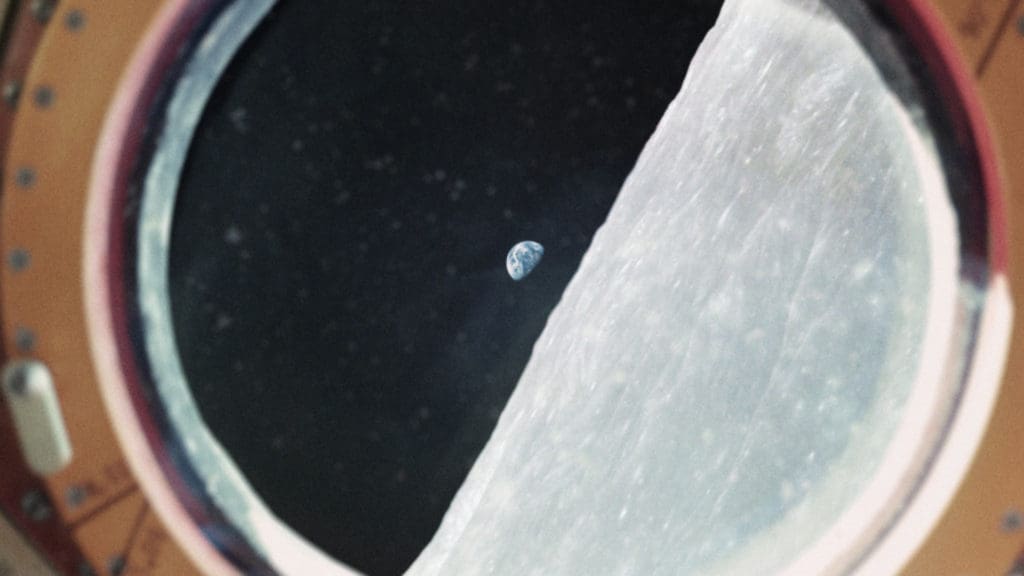 Photo Courtesy Prodigy PR
Photo Courtesy Prodigy PRWith the release of director Todd Douglas Miller’s Apollo 11 earlier this year, it seemed like 2019 had already gotten its one great space documentary. However, First to the Moon, the new documentary produced, directed and edited by Paul Hildebrandt proves that this may be the best year yet for film lovers who also love the space program.
As the title suggests, First to the Moon is generally about America’s involvement in the Space Race in the 1960s, but it tells that story through present day interviews with the three astronauts from 1968’s Apollo 8 mission: Jim Lovell, Frank Borman and William Anders. Though the film’s final act gives a detailed account of their mission to orbit the moon, the bulk of its runtime explores the events in their lives both in and out of the space program that led to that mission. Some of those stories, like the time Lovell lost power during a routine night flight and then had to locate and land on an aircraft carrier without radio assistance are really thrilling. Unfortunately, Hildebrandt gives stories like that so little room to breathe that the film can feel a bit relentless.
Apollo 11 so compelling because, by only using footage recorded at the time from NASA’s own archives, Miller’s film felt focused and urgent from start to finish. By contrast, while Hildebrandt’s film gives a more complete picture of Apollo 8 and the men who manned it, it also focuses so much on their lives and careers leading up to the mission that the audience is left wondering what point Hildebrandt is trying to make. Perhaps he’s trying to draw a line between the risky missions the men attempted before and the way their determination brought them to that historic mission, but Hildebrandt’s scope is so broad and wide-ranging, that it can be hard to clearly make that connection.
When Borman is tasked with investigating what caused the Apollo 1 malfunction that killed astronauts Virgil “Gus” Chisholm, Roger Chaffee and Ed White, Hildebrandt doesn’t show nearly enough about his work or how that affected Borman’s approach to his own missions. We hear him say in present day that the tragedy was largely due to shoddy workmanship (something borne out in the concurrent Congressional investigation), but the most he comments on the effect that the incident had on him or the program in general is to say, “It was a uh…revealing time.”
Still, while Hildebrandt’s film could benefit from more focus, when it details every moment of the Apollo 8 mission in its final third, First to the Moon becomes the great film it always should have been. Though some viewers will perhaps find the discussion overly technical, hearing Lovell, Borman and Anders talk about the mission, it’s impossible not to marvel at what an incredible feat of human excellence the entire space program was in the ‘60s.
Considering so much of the science behind the mission was hypothetical if deeply researched–including calculating when the astronauts would briefly lose communication with mission control– it seems incredible that the Apollo 8 mission went, “perfectly,” as Borman puts it. However, while moments where Anders notes that the “unbelievably violent” and noisy launch was the one thing that they never simulated or Lovell notes how “eerie” it was approaching the Saturn V rocket because all but a few technicians were 3.5 miles away since the rocket was carrying 5.5 million pounds of high explosive are striking, it’s the conversation around the way people both in and out of the space program reacted to the images the astronauts took of Earth during the mission that are most memorable.
Watching the way the men in the control room gathering around tiny black-and-white TV screens to marvel at footage of Earth from space is a reminder of just how incredible it must have felt to get that perspective on our planet for the first time. Anders, who recorded those images and the picture of the “Earthrise” over the curve of the moon’s surface perhaps puts it best. “We went all the way to the moon to explore the moon,” he says, “but what we really discovered was the Earth.” Indeed, in the end, what makes First to the Moon so impactful is seeing those now-familiar images again with the context of all the work that made them possible in the first place.
Despite its flaws, First to the Moon is undeniably great. It reminds viewers what it was like to marvel at everything America achieved during the Space Race while also, surprisingly, emphasizing what a beautiful, sacred place Earth is too. As Lovell puts it, though we think of Heaven as somewhere we go when we die, seeing Earth from the perspective of the Apollo 8 mission pushed him to wonder if we don’t go to Heaven when we’re born instead. Regardless of your religious beliefs, it’s incredible to think that human beings ended up on a planet perfectly balanced to support our existence. “In some aspects, God has really given us a stage on which to perform,” Lovell says. First to the Moon conveys just how much we’ve done on that stage.
First to the Moon is available on VOD today.
https://youtu.be/H_Gjy6tofSQ

